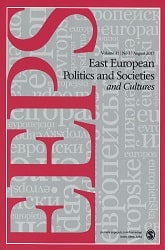Institutional Choice after Communism: A Critique of Theory-building in an Empirical Wasteland
Institutional Choice after Communism: A Critique of Theory-building in an Empirical Wasteland
Author(s): Michael H. BernhardSubject(s): Political Philosophy, Political Theory, Government/Political systems, International relations/trade, Comparative politics, Post-Communist Transformation
Published by: SAGE Publications Ltd
Keywords: Postcommunist transformation; international relations; political theory; theory-building; comparative politics;
Summary/Abstract: During the last decade there has been a trend within political science to discount the value of area-based comparative politics and argue that comparativists need to become more "scientific" like their colleagues in American politics and some branches of international relations. This tendency is evident in publications of the American Political Science Association such as PS: Politics and Political Science and CP-APSA (the newsletter of the organized comparative politics section of the association). A related development is the abolition of many of the area-based joint committees of the American Council of Learned Societies and the Social Science Research Council, at the behest of the SSRC, which is now more interested in supporting cross-national quantitative and formal research. In certain departments where behavioral and formal approaches predominate, area specialists are denigrated as mere "journalists" who just "report the facts." [...]
Journal: East European Politics and Societies
- Issue Year: 14/2000
- Issue No: 02
- Page Range: 316-347
- Page Count: 32
- Language: English
- Content File-PDF

